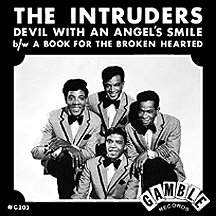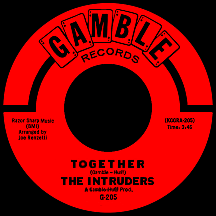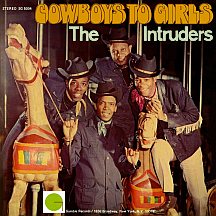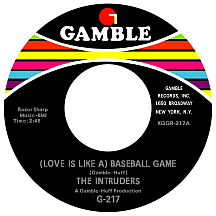THE INTRUDERS
In 1960, four friends between the ages of 16 and 20, influenced by gospel music and "street corner" harmonies (who'd begun a year or so earlier and gone through various configurations of five or six), settled on what became a longstanding lineup as a vocal quartet. Eugene Daughtry (nicknamed "Bird"), the oldest and only member born before 1940, moved northward with his family from Kinston, North Carolina to Philadelphia when he was a child. The other three were born and bred in Philly: 17-year-old Robert ("Big Sonny") Edwards, one-year-younger Phil Terry and the act's designated lead singer Samuel Brown, who everyone called "Little Sonny" (despite his being slightly older than "Big Sonny"). His unusual vocal style became The Intruders' trademark, branding their inevitable string of hits as unique and easily recognizable.
Before proceeding, let's get the other Intruders (not the breaking-and entering, interloping kind) out of the way. There was a trio from Hammonton, New Jersey (just 35 miles from the town with the cracked bell) that placed a slow-cooking guitar instrumental, "Fried Eggs," on the charts in March 1959. Four years later, another non-vocal Intruders band from Los Angeles recorded "Wild Goose" (a rockin' revision of Frankie Laine's 1950 hit "The Cry of the Wild Goose"). A singing garage band from Tucson, Arizona released "Let Me Stay" in 1964 and there was yet another rocking outfit with the name based in Pittsfield, Illinois, known for the 1966 single "She's Mine." It's likely there have been a few others, but you get the idea. Now we can move on without any further interruptions.
Legend has it the PA foursome showed up at a party one night without being invited. Word got around about "those intruders"...so if the name fits, why not use it? The euphonic party crashers made their first record in late 1961 for the Gowen label, a start-up owned by local songwriters Michael Golder and Charles Lotman, who penned both sides of the single. "Come Home Soon" didn't initially elicit much local brotherly love, but doo wop fans and collectors in New York and other eastern cities got caught up in the group's sound, particularly Little Sonny's anguished, occasionally off-key vocal approach, well-suited to the yearning contained in the song's lyrics. A second Gowen 45, "This is My Song" (credited to Four Intruders), stirred up less interest and a couple of years passed before insistent auditions gained them another opportunity.
"You Belong to Me" appeared in the summer of 1964 on MusicVoice Records and soon afterwards on its parent label, Musicor. Kenny Gamble heard the song and sought out the group. Gamble's career had gotten under way a few months earlier with his arrangement of The Sapphires' hit "Who Do You Love." A year passed before he and business partner Leon Huff cornered Sam Brown and his groupmates; "Gonna Be Strong" was penned and produced by the pair (as was nearly all their output from that point forward). Issued on G&H's Excel label, it received a smattering of airplay locally as well as in Cleveland and Chicago; the song scored top ten rankings at two prominent soul-formatted stations, WWIN in Baltimore and KDIA in Oakland, California. When Kenny realized there were no less than two Excel labels already in existence, he renamed it Gamble Records, after himself, and it remained that way for nearly a decade.
"(We'll Be) United" fared much better, reaching the national pop chart and climbing into the R&B top 20 in the summer of '66. "Devil With an Angel's Smile" had a milder run a few months later, followed by no-show "(You'd Better) Check Yourself" in early '67. Any downward trend was considered temporary by Gamble and Huff; they knew they had a classically-configured quartet fully adaptable to the evolving trends (more strings, more horns) taking hold in major cities like Chicago, New York and their own home town. That being said, Gamble took on outside projects in an effort to build his and Leon's profile; in '66 they'd written "I'm Gonna Make You Love Me" for Dee Dee Warwick and produced a top five smash, "Expressway to Your Heart," in '67 for white soul-pop band Soul Survivors. There were other projects with Lesley Gore, Freddie Scott and especially Jerry Butler (his entry into the practically-trademarked "Philadephia Sound" was moving towards dominance in the decade's final two years). Despite all this impressive work, the main goal of Gamble and Huff was to take the Intruders to the top.
While the group made the rounds of high-profile regional venues (N.Y.'s Apollo, D.C's Howard Theatre and Philly night spots Pep's Musical Bar and the Uptown Theater), "Together" took off, a heart-tugging ballad made even more emotional by Little Sonny's lead. It came close to the pop top 40 at 1967's midpoint while becoming their first to reach the R&B top ten. Late in the year, Kenny and Leon furthered a plan to subliminally embed the Intruders' melodies into listeners' brain cells; their earlier hit, "United," was recorded as a two-part instumental by The Music Makers, a name given the studio musicians on the group's recordings; several years later, many of them were part of of the chart-topping MFSB.
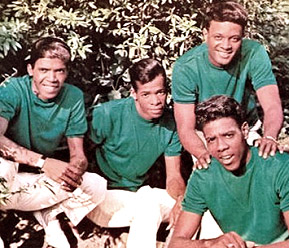
Could anyone have figured "Cowboys to Girls" would go mainstream, what with its quirky lyrics contrasting typical romantic ballads? 'I remember, when I used to play shoot 'em up...(bang bang, baby)...I remember, when I chased the girls and beat 'em up...' Hey, that requires an explanation! 'But I was young and didn't understand...but now I'm a grownup man...my whole world has been rearranged!' Little Sonny, whose delivery fell somewhere between juvenile and mature, seemed destined to deliver these lyrics without offense; 'You went from (baby dolls to boys)...and I went from (cowboys to girls)...ain't it fun reminiscing?' It was a formula with an outcome that couldn't be predicted. A simultaneous top ten pop hit, number one R&B smash and certified million seller in May 1968.
"(Love is Like A) Baseball Game," with a similar (but sports-inclined) set of metaphors, returned them to the pop top 30 and R&B top ten that summer. With arranger Bobby Martin, the group led all other soul acts of the time when it came to nostalgia-based romantic mini-plays. "Slow Drag," "Give Her a Transplant," "Me Tarzan You Jane" and "Lollipop (I Like You)" built their fan base despite (or perhaps because of) the unusual titles. In the fall of 1969, "Sad Girl" became their first remake of an oldie (originally recorded in 1963 by D.C. singer Jay Wiggins, who'd famously been imprisoned for refusing the draft during the Vietnam war). With the new decade came the first change in the quartet's lineup...an important one: lead singer Little Sonny quit! He was replaced by Bobby Starr (real name: Robert Ferguson) and despite the somewhat disappointing difference in sound, a remake of The Dreamlovers' ultra-blissful hit from '62 glided into the R&B (retitled Soul Singles) top ten in July 1970.
Each release (about two per year during this phase) achieved some degree of chart impact. Would the fans embrace Samuel "Little Sonny" Brown when he resumed his destiny? Musical arrangements had shifted closer to the rising disco trend and Little Sonny's vocals had certainly matured a bit. The answer came immediately. "(Win, Place or Show) She's a Winner" gave them a strong start in 1972, nearly reaching the Soul top ten...then its follow-up, "I'll Always Love My Mama," a six and a half minute track split into two parts (the second side a spoken tribute by the entire group), was embraced by fans and, presumably, moms in '73, their biggest hit in five years; a year later it became their first U.K. top 40 (previous single "She's a Winner" was a follow-up hit). Back home, "I Wanna Know Your Name" added to their string of Soul top tens in late '73.
Kenny Gamble and Leon Huff had kicked their operation into high gear by that time with the Philadelphia International label, making major stars of The O'Jays, Marold Melvin and the Blue Notes, Billy Paul, The Three Degrees and MFSB. The Gamble label was shuttered and the Intruders were moved to G&H's TSOP label, where they faded away over the course of three singles in 1974 and '75. Ten years after the breakup, Eugene Daughtry revived The Intruders with his brother, Fred Daughtry, cousin Al Miller and a friend, Lee Williams, finding momentary success in the U.K. on the Streetwave label with a Leon Bryant-produced track, "Who Do You Love." Daughtry died of cancer in 1994 and Little Sonny committed suicide the following year; both were in their mid-fifties. Phil Terry eventually became the last Intruder standing. But they'll always be "Together" in my memory.
NOTABLE SINGLES:
- Come Home Soon - 1961
- This is My Song - 1962
as Four Intruders - But You Belong to Me - 1964
- Gonna Be Strong - 1966
- (We'll Be) United - 1966
- Devil With an Angel's Smile - 1966
- (You'd Better) Check Yourself - 1967
- Together - 1967
- Baby I'm Lonely /
A Love That's Real - 1967 - Cowboys to Girls - 1968
- (Love is Like A) Baseball Game - 1968
- Slow Drag - 1968
- Give Her a Transplant - 1969
- Me Tarzan You Jane - 1969
- Lollipop (I Like You) - 1969
- Sad Girl - 1969
- Old Love - 1969
- Tender (Was the Love We Knew) - 1970
- When We Get Married - 1970
- This is My Love Song - 1970
- I'm Girl Scoutin' - 1971
- Pray for Me - 1971
- I Bet He Don't Love You (Like I Love You) - 1971
- (Win, Place or Show) She's a Winner - 1972
- I'll Always Love My Mama - 1973
- I Wanna Know Your Name - 1973
- A Nice Girl Like You - 1974
- Rainy Days and Mondays - 1975
- Plain Ol' Fashioned Girl - 1975
- Who Do You Love - 1984


